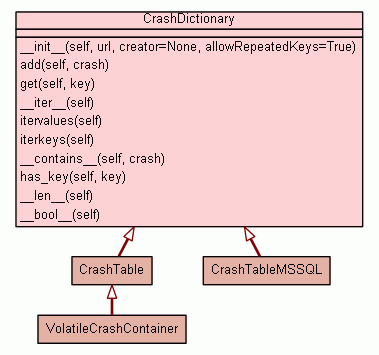
| Home | Trees | Indices | Help |
|
|---|
|
|

Dictionary-like persistence interface for Crash objects.
Currently the only implementation is through sql.CrashDAO.
|
|||
|
|||
|
|||
| Crash object. |
|
||
| iterator |
|
||
| iterator |
|
||
| iterator |
|
||
| bool |
|
||
| bool |
|
||
| int |
|
||
| bool |
|
||
|
Inherited from |
|||
|
|||
|
Inherited from |
|||
|
|||
x.__init__(...) initializes x; see help(type(x)) for signature
|
Adds a new crash to the container.
Note:
When the See Also: Crash.key |
Retrieves a crash from the container.
See Also: iterkeys Warning: A copy of each object is returned, so any changes made to them will be lost. To preserve changes do the following:
|
|
|
|
|
|
|
|
| Home | Trees | Indices | Help |
|
|---|
| Generated by Epydoc 3.0.1 on Fri Dec 20 17:54:51 2013 | http://epydoc.sourceforge.net |